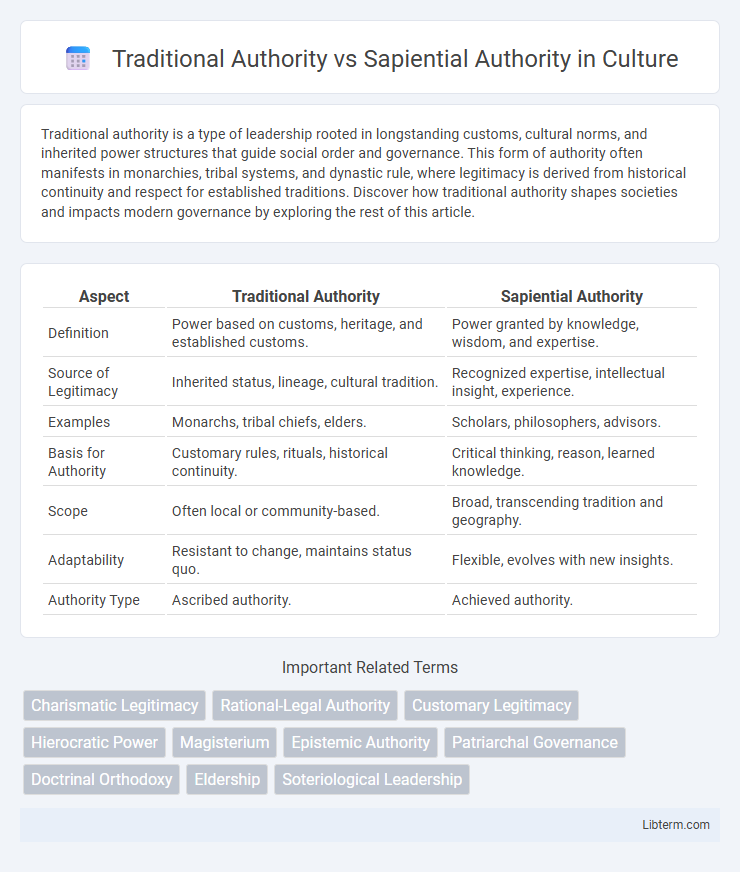Traditional authority is a type of leadership rooted in longstanding customs, cultural norms, and inherited power structures that guide social order and governance. This form of authority often manifests in monarchies, tribal systems, and dynastic rule, where legitimacy is derived from historical continuity and respect for established traditions. Discover how traditional authority shapes societies and impacts modern governance by exploring the rest of this article.
Table of Comparison
| Aspect | Traditional Authority | Sapiential Authority |
|---|---|---|
| Definition | Power based on customs, heritage, and established customs. | Power granted by knowledge, wisdom, and expertise. |
| Source of Legitimacy | Inherited status, lineage, cultural tradition. | Recognized expertise, intellectual insight, experience. |
| Examples | Monarchs, tribal chiefs, elders. | Scholars, philosophers, advisors. |
| Basis for Authority | Customary rules, rituals, historical continuity. | Critical thinking, reason, learned knowledge. |
| Scope | Often local or community-based. | Broad, transcending tradition and geography. |
| Adaptability | Resistant to change, maintains status quo. | Flexible, evolves with new insights. |
| Authority Type | Ascribed authority. | Achieved authority. |
Defining Traditional Authority
Traditional authority is a form of power rooted in established customs, cultural heritage, and long-standing social structures, where legitimacy is derived from historical continuity and inherited status. This authority type often relies on rituals, lineage, and the respect for age-old practices to maintain order and governance. In contrast, sapiential authority is based on recognized expertise, wisdom, or specialized knowledge, emphasizing intellectual credibility over inheritance or custom.
Understanding Sapiential Authority
Sapiential authority derives from recognized wisdom, expertise, and deep knowledge within a specific domain, distinguishing it from traditional authority, which is based on inherited or established customs. This form of authority commands respect through demonstrated intellectual competence and the ability to provide insightful guidance. Understanding sapiential authority involves recognizing its dynamic nature, rooted in continuous learning, critical thinking, and the capacity to adapt knowledge to evolving contexts.
Historical Origins of Both Authorities
Traditional authority originates from long-established customs, cultural heritage, and inherited power structures rooted in ancient social orders and tribal leadership. Sapiential authority derives from recognized wisdom, expertise, and intellectual merit, historically linked to scholars, religious leaders, and philosophers who gained influence through knowledge and moral insight. Both forms of authority have shaped governance systems, with traditional authority emphasizing continuity and social stability, while sapiential authority emphasizes rationality and informed guidance.
Foundational Principles of Traditional Authority
Traditional authority is rooted in longstanding customs, established social structures, and inherited roles, emphasizing continuity and obedience to established norms. Its foundational principles include legitimacy derived from historical precedence, loyalty to established institutions, and the preservation of cultural heritage. Unlike sapiential authority, which is based on knowledge and expertise, traditional authority maintains social order through inherited legitimacy and collective identity.
Core Characteristics of Sapiential Authority
Sapiential authority is grounded in profound wisdom, experience, and specialized knowledge, distinguishing it from traditional authority, which relies on established customs and heritage. Core characteristics of sapiential authority include expertise, rationality, and the capacity to provide insightful guidance based on deep understanding. This type of authority commands respect through demonstrated competence and intellectual rigor rather than inherited status or ritualistic legitimacy.
Key Differences Between Traditional and Sapiential Authority
Traditional authority derives its legitimacy from longstanding customs, cultural heritage, and inherited positions, often seen in monarchies or tribal leaderships. Sapiential authority, on the other hand, bases its legitimacy on knowledge, wisdom, and expertise, typically held by scholars, philosophers, or intellectual leaders. Key differences lie in the source of power--tradition versus wisdom--and the criteria for obedience, with traditional authority demanding loyalty to established norms while sapiential authority requires recognition of intellectual competence.
Social Impacts of Each Authority Type
Traditional authority, rooted in customs and inherited roles, reinforces social cohesion and stability by maintaining established norms and cultural identity within communities. Sapiential authority, derived from recognized knowledge and expertise, promotes innovation and adaptive governance by encouraging critical thinking and informed decision-making. The social impact of traditional authority often sustains hierarchical structures, while sapiential authority tends to foster meritocratic and dynamic social interactions.
Real-World Examples: Traditional vs Sapiential Authority
Traditional authority, rooted in customs and inherited status, is exemplified by monarchies like the British royal family, where legitimacy stems from historical continuity. Sapiential authority derives from recognized expertise or wisdom, seen in institutions such as the Supreme Court, where rulings are based on legal knowledge and intellectual merit. Conflicts between traditional rulers and expert advisors, like tribal chiefs versus modern technocrats in developing nations, illustrate the tension between these two sources of authority.
Challenges and Critiques of Both Models
Traditional authority faces challenges related to rigidity and resistance to change, often resulting in governance systems that may lack adaptability and inclusivity. Sapiential authority is criticized for its reliance on specialized knowledge, which can lead to elitism and disconnect from the broader population's needs and values. Both models struggle with legitimacy issues in modern societies where diverse perspectives and democratic principles demand more participatory and transparent leadership structures.
Relevance in Modern Governance and Society
Traditional authority, rooted in established customs and hereditary leadership, maintains relevance in governance by fostering social stability and community identity, particularly in rural and indigenous contexts. Sapiential authority, derived from expertise and wisdom, drives modern societies towards informed decision-making and innovation, enhancing effective governance structures. Balancing these authorities enables governments to respect cultural heritage while promoting evidence-based policies in complex social environments.
Traditional Authority Infographic

 libterm.com
libterm.com